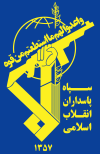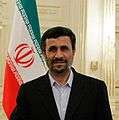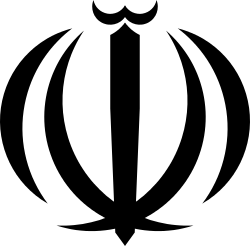Ahmad Vahidi
| Sardar Ahmad Vahidi | |
|---|---|
 Ahmad Vahidi in 2004 | |
| Minister of Defense | |
|
In office 3 September 2009 – 15 August 2013 | |
| President | Mahmoud Ahmadinejad |
| Preceded by | Mostafa Mohammad-Najjar |
| Succeeded by | Hossein Dehghan |
| Personal details | |
| Born |
27 June 1958 Shiraz, Iran |
| Nationality | Iranian |
| Military service | |
| Allegiance | Iran |
| Service/branch | Revolutionary Guards |
| Years of service | 1979–present |
| Rank | Brigadier General |
| Commands | Quds Force[1] |
Ahmad Vahidi (Persian: احمد وحیدی, born 27 June 1958) is an Iranian military commander of the Revolutionary Guards.[2] In 1988, he was appointed as the commander of its extraterritorial special forces, Quds Force.[3] He was the minister of defense under Mahmoud Ahmadinejad, having held the post from 3 September 2009 until 15 August 2013. Vahidi is president of the Supreme National Defense University since August 2016.[4]
Early life and education
Vahidi was born on 27 June 1958 in Shiraz.[5] His real name is Ahmad Shah Cheraghi (his nickname is Vahid).[5] He holds a bachelor's degree in electronics and a master's degree in industrial engineering.[5] He received a PhD in strategic studies from Imam Sadegh University.[6]
Career
Vahidi joined Revolutionary Guards in 1979.[5] He was made deputy to the then Revolutionary Guards commander Mohsen Rezai for intelligence affairs in 1981.[5] The same year he was also named commander of the Balaal base.[5] In 1983, he joined the Quds Force, a unit of the Revolutionary Guards that is responsible for operations outside of Iran.[5] He holds the rank of brigadier general.[7]
Vahidi was appointed deputy minister of defense in 2005 when Mostafa Mohammad-Najjar became minister of defense.[6] He was in office until 2009. In August 2009, he was appointed minister of defense by President Mahmoud Ahmadinejad and on 3 September 2009, the Majlis endorsed Vahidi as minister of defense with vote of 227 of 286.[8] He received 79.3% of the votes of the members of the parliament. Vahidi's term ended on 15 August 2013 and Hossein Dehghan replaced him in the post.[9]
Controversies
Vahidi has been wanted by Interpol since 2007 for his alleged participation in the bombing of the Jewish community center in Buenos Aires, Argentina, on 18 July 1994, in which 85 people died.[10][11] Vahidi was serving as the commander of a special unit of Iran's Revolutionary Guard known as the Quds Force when the attack occurred.[10] He is one of five Iranians sought in the bombing. Iran denies that it was involved.[12]
In June 2010, Vahidi was blacklisted by the U.S Government, a measure which is aimed at freezing the assets of proliferators of weapons of mass destruction (WMD) and their supporters thereby isolating them from the U.S. financial and commercial systems.[13]
In May 2011, Vahidi paid an official visit to Bolivia.[14] Upon this event in June 2011, Bolivia apologized to Argentina for Ahmad Vahidi visiting the country, and announced that he would be leaving the country immediately.[15]
References
- ↑ "Behind the Headlines: Iran's terrorist defense minister". Israeli Ministry of Foreign Affairs. 23 August 2009. Retrieved 28 August 2009.
- ↑ "Iran defense minister a terror suspect". The Washington Times. 21 August 2009. Retrieved 23 August 2009.
- ↑ Kenneth Katzman (6 February 2017), "Iran's Foreign and Defense Policies" (PDF), Congressional Research Service, Federation of American Scientists, p. 25, retrieved 1 March 2017
- ↑ "Iran News Round Up – August 3, 2016". AEI Critical Threats Project. 3 August 2016. Retrieved 31 January 2017.
- 1 2 3 4 5 6 7 Sahimi, Mohammad (1 August 2012). "The IRGC Strategic Brain Trust Part 1: Ghasem Soleimani and Ahmad Vahidi". PBS. Retrieved 31 July 2013.
- 1 2 "A Brief Biography of Iran's New Ministers". Payvand. 7 September 2009. Retrieved 22 February 2013.
- ↑ "Iran's ex-defense minister claims country is world's 6th missile power". Tehran: Fox News. AP. 18 August 2013. Retrieved 24 August 2013.
- ↑ "Majlis endorses 18 ministers, one woman". Press TV. 3 September 2009. Archived from the original on 6 September 2009. Retrieved 5 September 2009.
- ↑ Fulton, Will (7 August 2013). "Rouhani's Cautious Pick For Defense Minister". Al Monitor. Archived from the original on 10 August 2013. Retrieved 11 August 2013.
- 1 2 "Iran Parliament Approves Minister Wanted in Deadly Jewish Center Bombing". Fox News. AP. 3 September 2009. Retrieved 21 January 2013.
- ↑ "Argentina: More international arrest warrants issued for 1994 Jewish center bombing". South American Political and Economic Affairs. 16 November 2007. Retrieved 25 March 2013.
- ↑ "Iran rejects as "baseless" Argentina's accusation it was involved in bombing". KUNA. 3 October 2010. Retrieved 21 January 2013.
- ↑ "U.S. Treasury Department Targets Iran's Nuclear and Missile Programs". US Treasury Department. Retrieved 21 January 2013.
- ↑ Yapp (1 June 2011). "Iran defence minister forced to leave Bolivia over 1994 Argentina bombing". The Telegraph. São Paulo. Retrieved 24 August 2013.
- ↑ "Bolivia apologizes to Argentina for Iran minister visit". BBC News. Retrieved 1 June 2011.
External links
| Wikimedia Commons has media related to Ahmad Vahidi. |
| Military offices | ||
|---|---|---|
| New title | Commander of Quds Force 1988–1998 |
Succeeded by Qasem Soleimani |
| Political offices | ||
| Preceded by Ali-Reza Asgari |
Deputy Minister of Defense August 2005 – 3 September 2009 |
Succeeded by Asadollah Emami |
| Preceded by Mostafa Mohammad-Najjar |
Minister of Defense 3 September 2009 – 15 August 2013 |
Succeeded by Hossein Dehghan |
| Academic offices | ||
| Preceded by Ali Shamkhani |
Chairman of the Center for Strategic Defence Research 27 September 2013 – present |
Incumbent |
| Preceded by Ebrahim Hassan-Beigi |
President of the Supreme National Defense University 3 August 2016 – present | |


